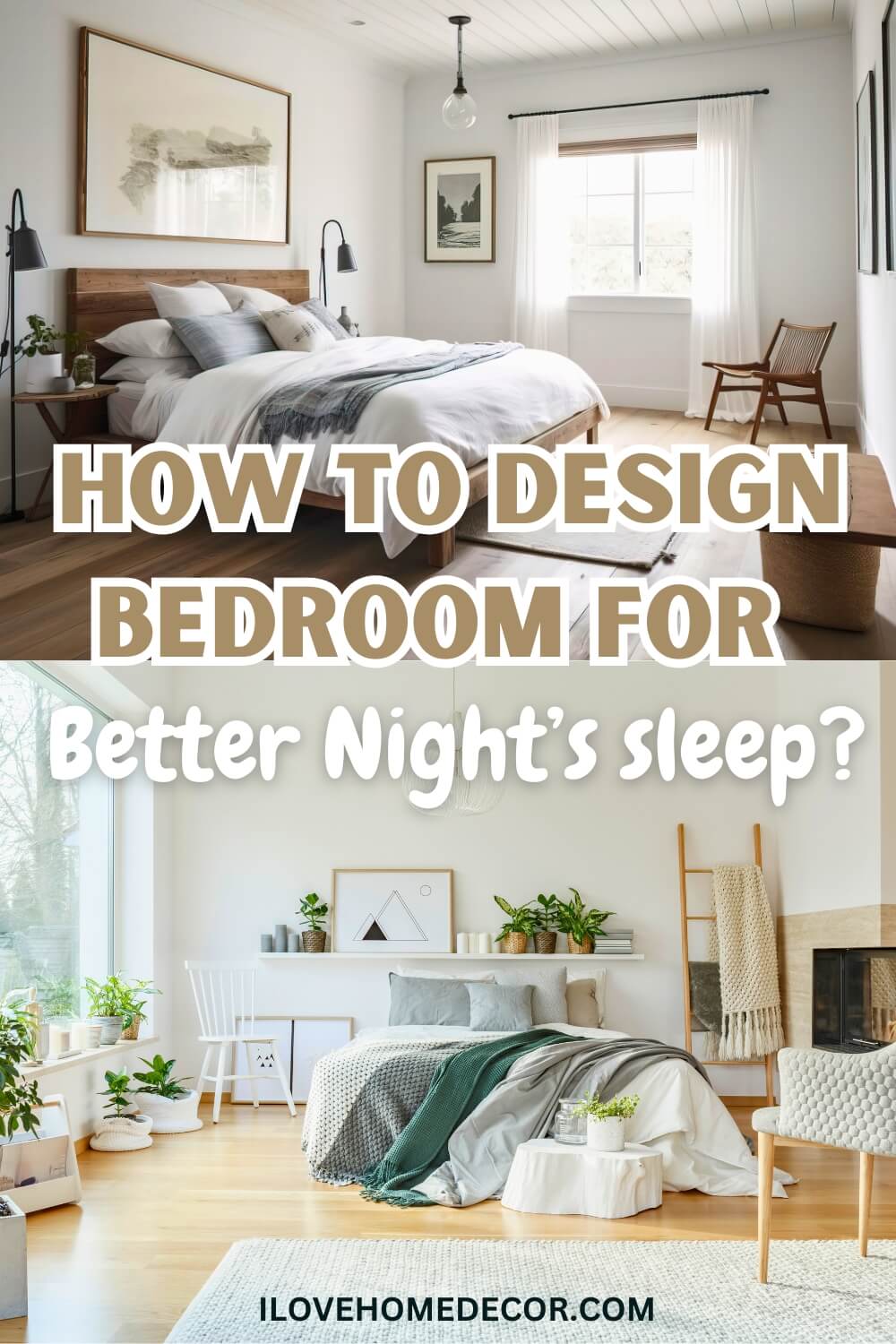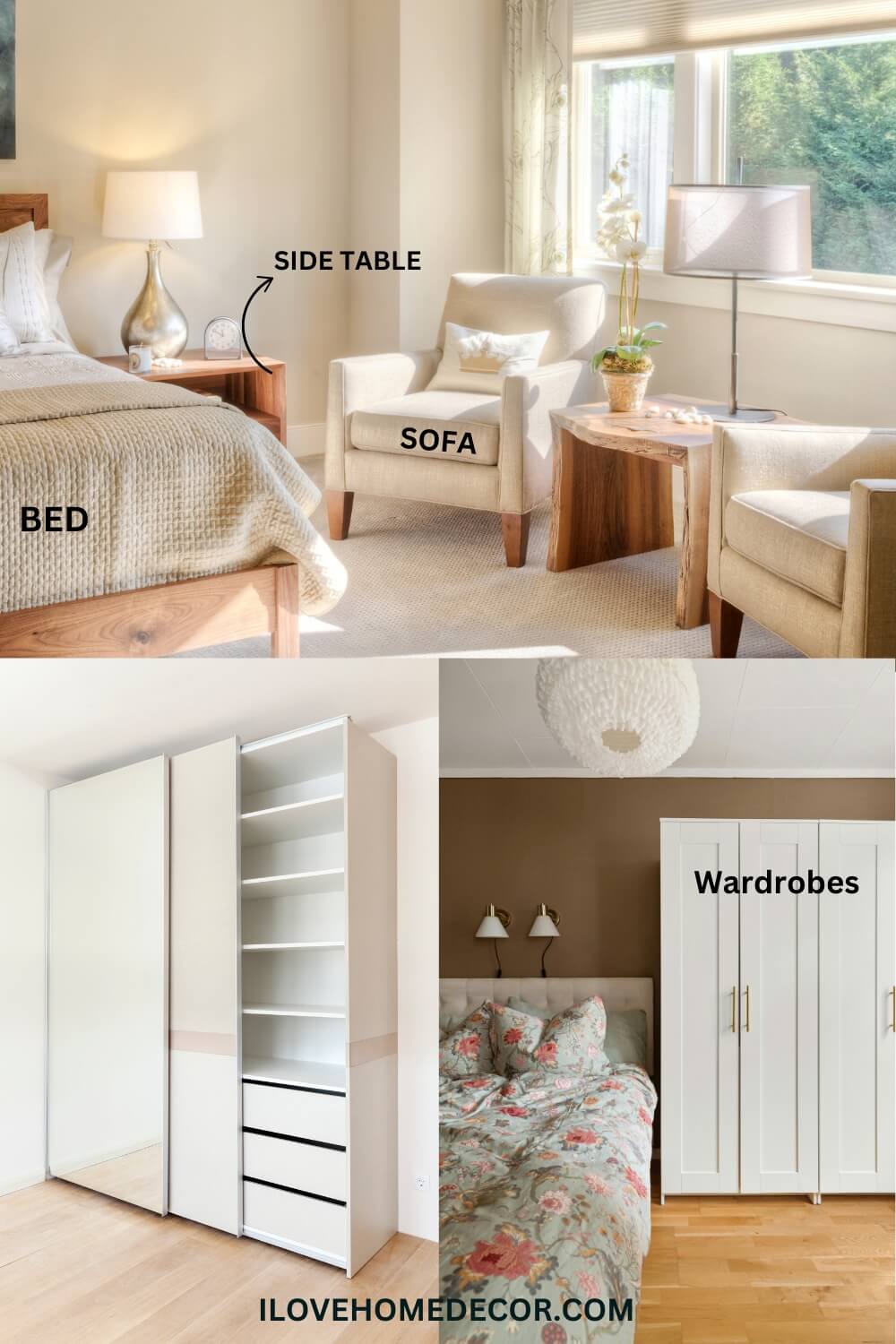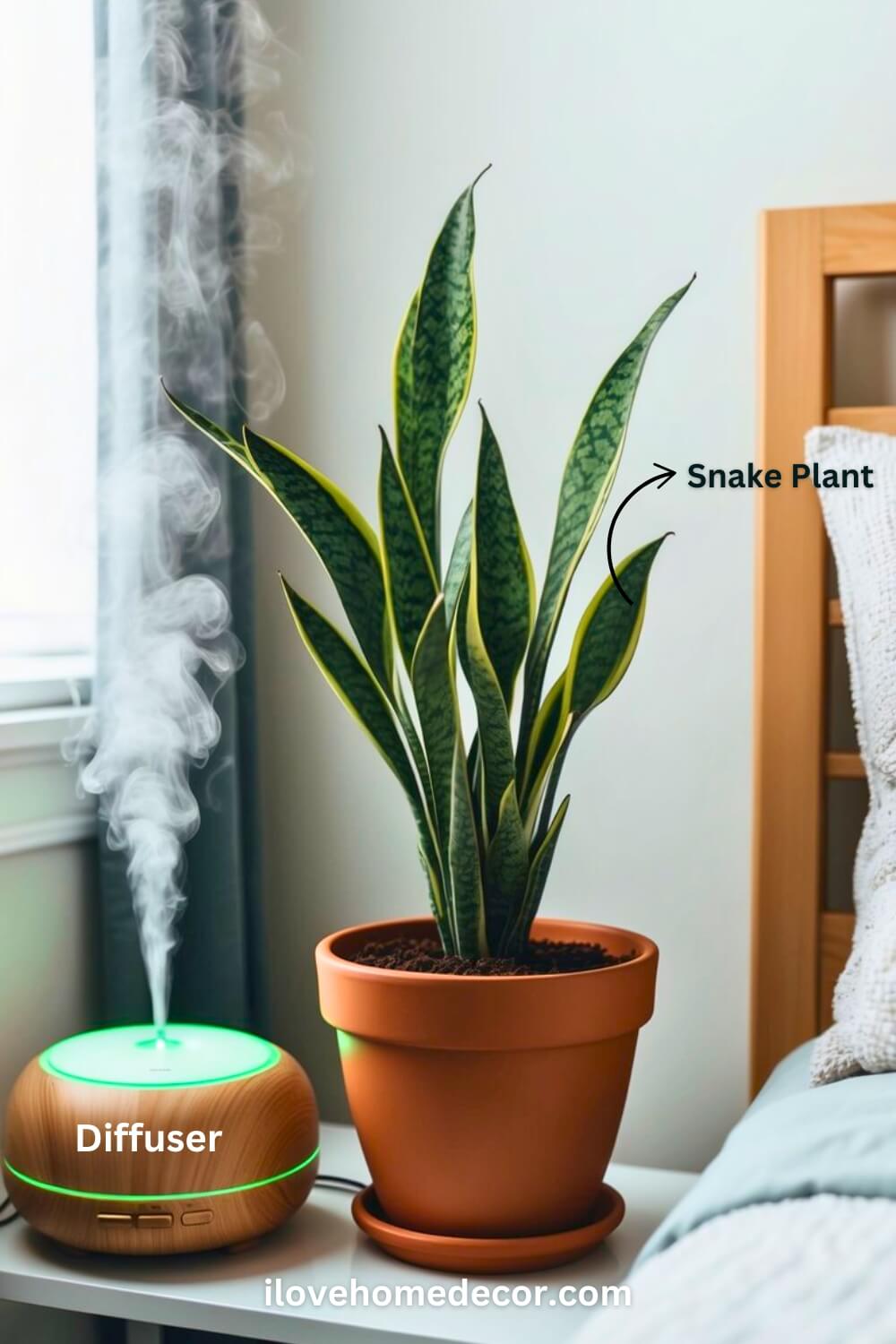Sleep is vital for physical health, mental clarity, and emotional well-being, yet many struggle to rest deeply because their bedroom isn’t optimized for relaxation.
Lighting, colors, furniture, bedding, and more can either promote sleep or disrupt it. This guide offers practical, science-backed strategies—enriched with insights from iLoveHomeDecor—to transform your bedroom into a sleep sanctuary.

Lighting: Crafting a Sleep-Inducing Glow
Light shapes your circadian rhythm, the internal clock regulating sleep and wakefulness. Bright, cool-toned light signals alertness, while dim, warm light encourages rest by supporting melatonin production.
Here’s how to optimize it:
- Dimmable Lights: Gradually lower brightness to ease into sleep mode.
- Blackout Curtains: Block external light for deeper rest.
- Red/Amber Nightlights: Offer subtle illumination without disrupting melatonin.
Use dimmer switches or adjustable lamps with bulbs around 2700K for a warm, sunset-like glow. Blackout curtains create a dark, cave-like space, ideal for uninterrupted sleep.
Meanwhile, red or amber nightlights minimize sleep disruption compared to blue or white light.
Here’s a handy comparison of bulb types to guide your choices:
| Bulb Type | Color Temperature | Melatonin Impact | Best Use |
|---|---|---|---|
| Incandescent | 2700K (warm) | Low | Bedside lamps |
| LED (warm white) | 2700K-3000K | Low | Overhead lights, lamps |
| Smart Bulbs | Adjustable | Varies | Programmable routines |
Expert Tip from iLoveHomeDecor: “Smart lighting systems can revolutionize your sleep routine. Program them to dim gradually over an hour before bedtime, mimicking a natural sunset and gently preparing your body for rest.”
Color Scheme: Painting a Path to Relaxation
Colors influence your emotional and physiological state.
Research shows that certain hues can calm the nervous system, making them ideal for a sleep-focused space, while others can keep you wired. Consider these options:
- Blue: Lowers heart rate and promotes a sense of calm, perfect for unwinding.
- Green: Evokes nature’s tranquility, reducing stress and fostering peace.
- Beige: Creates a neutral, uncluttered vibe that soothes the mind.
Opt for low-VOC paint to maintain clean air quality, and supporting rest.
Expert Tip from iLoveHomeDecor: “Layer textures like a plush rug in your chosen hue for added calm.”
Furniture Arrangement: Building a Restful Flow
The layout of your bedroom can either enhance its serenity or introduce subtle chaos.
A well-arranged space feels open and secure, signaling to your brain that it’s safe to let go and rest.
Here are key tips:
- Bed Positioning: Position your bed against a solid wall—not aligned with doors or windows—for a sense of security, a principle tied to Feng Shui’s command position
- Furniture Placement: Keep minimal and purposeful, positioned away from the bed to maintain an open feel.

| Storage Solution | Pros | Cons | Best For |
|---|---|---|---|
| Under-bed bins | Hidden, spacious | Hard to access | Seasonal items |
| Woven baskets | Stylish, portable | Limited capacity | Everyday essentials |
Expert Tip from iLoveHomeDecor: “In tight spaces, a sleek platform bed with under-mattress storage keeps the floor clear, making the room feel larger and more restful.”
Bedding: The Foundation of Comfort
Your bed is where sleep happens, so its components—mattress, pillows, sheets—deserve careful attention. Comfort here isn’t just luxury; it’s a necessity for quality rest. Consider these mattress types:
- Hybrid: Blends support with cushioning, balancing firmness and comfort.
- Memory Foam: Molds to your body, easing pressure points for a cradled feel.
- Latex: Offers a buoyant, responsive sensation, ideal for those who shift positions.
The mattress sets the tone. Choose one that aligns with your sleep style: memory foam molds to your body, relieving pressure; latex provides a buoyant, responsive feel; and hybrids combine support with cushioning.
Test firmness levels—medium to medium-firm suits most, balancing spinal alignment with comfort. Replace it every 7-10 years, as sagging or worn-out mattresses can erode sleep quality over time.
Choose pillows based on sleep position—thick for side sleepers, medium for back, thin for stomach—to maintain spinal alignment. Use breathable cotton or linen sheets (200-400 thread count) to regulate temperature.
| Sleep Position | Pillow Type | Benefits |
|---|---|---|
| Side | Thick, firm | Supports neck alignment |
| Back | Medium support | Balances comfort and alignment |
| Stomach | Thin, soft | Prevents neck strain |
Expert Tip from iLoveHomeDecor: “Organic cotton sheets are a top pick—they’re luxuriously soft, breathable, and free from chemicals that could irritate your skin or disrupt sleep.”
Temperature and Noise Control: Fine-Tuning the Environment
Even the coziest bedroom falters if it’s too warm, too cold, or too loud. These factors directly affect how easily you fall—and stay—asleep. Here’s how to manage them:
- Temperature: Keep between 60-67°F (15-19°C) to align with your body’s natural sleep cues.
- Noise: Use white noise machines or fans to mask disruptive sounds, creating a soothing backdrop.
Mask noise with white noise machines or thick curtains to create a steady, soothing backdrop.
| Issue | Ideal Condition | Solutions |
|---|---|---|
| Temperature | 60-67°F (15-19°C) | Programmable thermostat, fans, bedding |
| Noise | Minimal, consistent sound | White noise machine, thick curtains |
Expert Tip from iLoveHomeDecor: “A weighted blanket can enhance temperature control and reduce noise sensitivity, doubling down on sleep benefits.”
Minimizing Technology: Clearing Digital Noise
Screens emit blue light that suppresses melatonin and keeps your mind active.
Here’s what to watch for:
- Phone: Emits blue light and creates a mental buzz from notifications.
- TV: Delivers blue light and engaging content that delays sleep onset.
- Laptop: Combines blue light with work-related stress, keeping you alert.
Avoid devices in bed—scrolling on a phone or watching TV from under the covers delays sleep by stimulating your brain.
If a TV resides in your bedroom, reposition it away from direct view and power it off 30-60 minutes before sleep. Better yet, banish it entirely, reserving the room for rest alone.
For unavoidable evening screen time, blue light filters—on devices or via glasses—can soften the impact. Still, the mental buzz from notifications or content lingers, so set a firm cutoff. Charge devices outside the bedroom to break the habit of late-night checks.
Expert Tip from iLoveHomeDecor: “Set up a charging station in the hall or living room. It’s a simple way to keep devices out of your sleep space.”
Organization and Clutter: A Clear Space, A Calm Mind
A cluttered bedroom breeds anxiety, making it harder to unwind. Order, conversely, signals peace.
Try these strategies:
- Declutter Regularly: Sort through items monthly to keep only what serves a purpose or brings joy.
- Smart Storage: Use under-bed bins or woven baskets to hide essentials without crowding the room.
- Make Your Bed Daily: Sets a tone of calm, visually anchoring the space.
Declutter regularly—sort through clothes, books, and odds-and-ends monthly, keeping only what’s necessary or meaningful. Smart storage, like under-bed bins, closet organizers, or woven baskets, conceals essentials without crowding the room. A daily habit as simple as making your bed sets a tone of calm, visually anchoring the space.
In smaller rooms, every inch counts. A nightstand with drawers or a shelf above the headboard can corral necessities, freeing the floor for breathing room.
| Storage Solution | Pros | Cons | Best For |
|---|---|---|---|
| Under-bed bins | Hidden, spacious | Hard to access | Seasonal items |
| Woven baskets | Stylish, portable | Limited capacity | Everyday essentials |
Expert Tip from iLoveHomeDecor: “Multi-functional furniture, like a bed with built-in drawers or a storage ottoman, maximizes space and keeps clutter at bay effortlessly.”
Additional Touches

Enhance sleep with sensory cues. Lavender via diffusers deepens rest, while nature sounds from a machine soothe the mind. Air-purifying plants like snake plants improve oxygen levels.
Expert Tip from iLoveHomeDecor: “Low-maintenance plants like snake plants thrive in dim light and purify the air, making them perfect for a sleep-focused bedroom.”
Final Words
A sleep-friendly bedroom blends dim lighting, calming colors, thoughtful layouts, and cozy bedding. Control temperature and noise, minimize tech, and keep it clutter-free.
Add scents or plants for a final touch. With these tips—and iLoveHomeDecor’s wisdom—restful nights await.
References
- National Sleep Foundation – Ideal Bedroom Temperature
- Harvard Health – Blue Light and Sleep
- American Psychological Association – Colors and Mood
- Mayo Clinic – Choosing the Right Pillow
- EPA – VOCs and Indoor Air Quality
- NCBI – Lavender and Sleep
- NASA – Air-Purifying Plants
- The Spruce – Feng Shui Bed Positioning

Hello! I’m Basana Saha, the Founder and Editor of iLoveHomeDecor. Through this blog, I share my passion for home decoration and interior styling. As someone who believes every space has untapped potential, I explore creative ways to make homes both beautiful and welcoming. My journey began with transforming my own living space, which sparked a deep interest in interior design and decoration. Through extensive research, countless hours of design exploration, and collaboration with industry experts, I bring fresh perspectives and practical ideas to help you create spaces you’ll love. Whether you’re a design enthusiast or just starting your home decoration journey, iLoveHomeDecor offers inspiration, tips, and solutions for every budget.